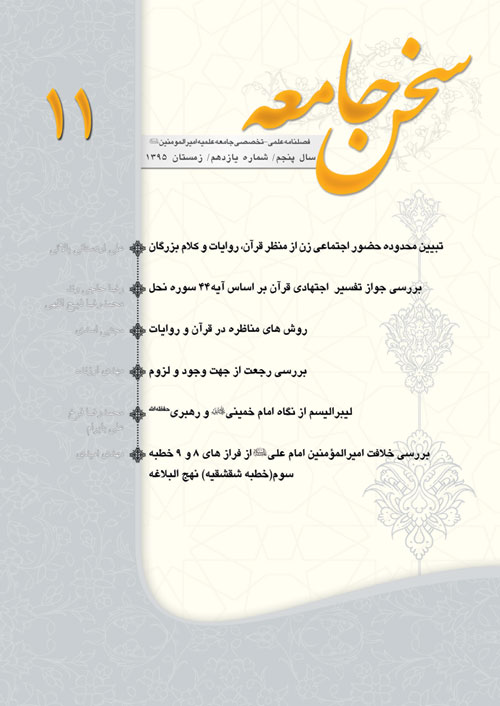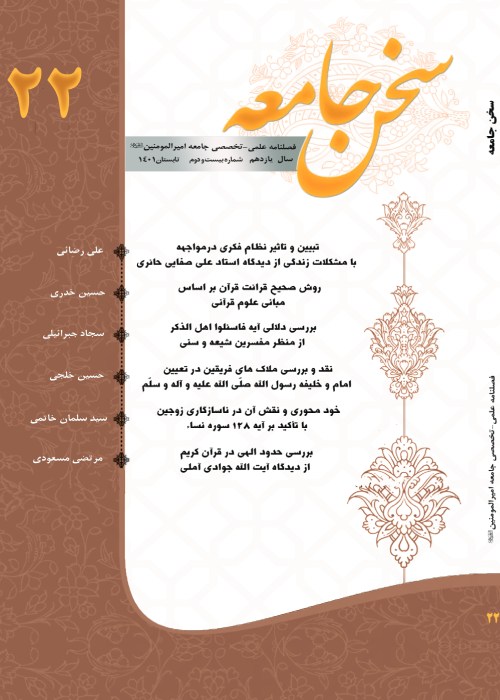فهرست مطالب

فصلنامه سخن جامعه
پیاپی 11 (زمستان 1395)
- بهای روی جلد: 500ريال
- تاریخ انتشار: 1395/12/24
- تعداد عناوین: 7
-
صفحه 5
-
صفحه 41
-
صفحه 57
-
Page 7In this article, the range of womens social presence has been investigated from the point of view of the Quran, narrations, and the words of elders by the library method and a comprehensive article has been presented in order to bring enough knowledge to the women of this country in relation to this issue from the perspective of Islam, so that they can fully defend their rights by relying on the point of view of Islam. This matter has been subject to various interpretations and opinions throughout human history, and there are many extremes in this regard; some people find the range of womens activities to be restricted to maternity and paternity and in contrast, some believe that women must come to different social arenas and be effective, in addition to these two roles. However, it does matter to us what should be the range of womens presence in the society? After expressing the need to explain the worthy position of women in the social systems, and the need for awareness of the perspective of Islam on womens social activities and expressing the examples of womens social, political, economic and worship activities in the Holy Quran, Sunnah of infallible (Piece Be Upon Them) and history of Islam to confirm the women presence and activities in the society, we have discussed the restrictions and customs of women presence in the society from the perspective of Islam and its damages to clarify the issue, resorting to the word of revelation and the claims of the infallibles, as well as the words of the elders.Keywords: Quran, narrations, word of elders, woman, woman's presence, woman's activity, society, restriction
-
Page 33The paper article seeks to prove the to ijtihad interpretation permission of the Quran in accordance with verse 44 of the Surah al- Nahl. As we know, the Quran is a means of human guidance, and when guidance is realized that we have a proper understanding of its concepts and purposes and it will not be achieved except through the interpretation of the Holy Quran. Among a variety of interpretive methods such as (pure rational, pure narrative, etc.), the method of i ijtihadi interpretation is of particular importance; because the interpreter uses all the interpretive capacities to reach the teachings of the Quran. If we consider the reason as an instrument for understanding the divine teachings and assume it as a light that neither reduces the fact nor adds to it, rather it is only the aspect of enlightenment, it can be said that reason in inferring divine knowledge is such as the Book and Sunnah. In answering the question of why ijtihad interpretation is the most complete and comprehensive form of interpretation, one can say: The interpreter pays attention to the Quranic verses using the right mind and understanding and transcends the fence of narratives and uses rational data in interpretation while exploiting narratives and trusts the accurate and deep understanding of the mean99 ings of the Qurans words in addition to understanding its referent. In short, this paper seeks to prove ijtihad interpretation of Quran in accordance with verse 44 of Surah al-Nahl and makes it clear that this verse not only does not imply the prohibition of ijtihadi interpretation of Quran, but also it is a solid Quranic document in ijtihadi interpretation. The research is carried out with library method.Keywords: interpretation, thinking, Ijtihdi interpretation, Quran, Verse 44 of Surah al-Nahl, implication, permission
-
Page 41The debate is the best way of teaching divine knowledge and belief, philosophy and sentences and the most effective way to develop wisdom and to grow society that the Quran orders the prophet of Islam to use the method of debate to promote the teachings of Islam and this is seen in the practical life of prophets and their companions and disciples. The debate there has been since the creation of mankind and will continue to be, because it provides the context for the growth and improvement of beliefs. In this paper we try to consider the different aspects and methods of debates and its rituals from the perspective of the Quran and narrations. In this article, first, a lexical and terminological definition of the word and term of the debate is presented and then, the types and forms of debate are expressed during the discussion of the benefits and rituals of the debate in a nutshell. In the following, we have explained the impact of praised and condemned debates on the society. Finally, we have mentioned a narrative example of the debates of the disciples of Ahl al-Bayt , in order not to be ambiguous from the point of view of the subject matter. The research is carried out with library method and the information in this article is collected and written by searching and studying related books.Keywords: debate, controversy, Quran, narrations, praised debate, condemned debate, persuasive, violation
-
Page 57We collected this research by referring to different books including interpretive, narrative and narrators and expressed the content by reflecting on it. In this research, we first presented the lexical definition of return which means coming back and then described the terminological definition which means a great return after the advent. In the next step, we will prove the return whether it is possible or not? To answer this question, we will raise some reasons from the perspective of reason, the Quran, and narratives and then discuss the history of the return, that since when this discussion has been raised, and who have been its proponents and opponents, and how was each of the opponents responded. Then we will introduce the returning persons. we have named some of the Imams, as mentioned in the traditions and then, expressed the Sunni viewpoint. Here we will find that they do not know the definition and has not understood the return. Finally, we conclude the legitimacy of the return and the necessity of believing in it.Keywords: return, reason, return in Quran, return in narrations, returning persons, return history
-
Page 65The school that has been able to conquer the international community in the present world and emerge in various personal, social and political arenas is the school of liberalism that today, after most of the past two centuries, most of the worlds governments have been involved. But the question that is posed to any freethinker in confronting the different facets of this school is what steps has the school passed to progress to such an extent? What were and are its intellectual principles and what is the end of these principles that are in raised the philosophical arena, in the field of social sciences? For example, what does liberalism stance for to the principle of individualism and the socialism, which are philosophical bases? So that it can be reach the principle of the authenticity of the state or the principle of weakening the government in the realm of liberal government. In this paper, with a view to the historical evolution of the path towards the emergence of liberalism, which in fact represents the symbol of liberalism in the realm of society and reality, we will address the scientific fundamentals of the school of liberalism which turn to principles such as principles of liberty, constraints on the powers of governments, tolerance and so on, after expressing the philosophical foundations of philosophy, including humanism, based on Goddess, individualism, self-interest etc and it will be shown that liberalism in its historical path, indeed, became the realm of governance with the new slogan of social liberty which it was proved to be not more than an empty slogan. Of course, the problem does not end here, but each of intellectual components and principles of liberalism faces many problems that the main drawbacks are their lack of realism and the weakness of their foundation and the leader has realized it well in his speeches.Keywords: Liberalism, Imam Khomeini, Leader, Individualism, Humanism
-
Page 83The issue of the caliphate and succession of the Prophet (Peace be upon him) is one of the important discussions that has long been discussed among Muslims and various opinions have been expressed about it; this issue can be studied and analyzed from different angles. If the reality turns out, many of the issues surrounding it will also be clear. In this paper, the author has examined the issue of caliphate in light of sayings of Imam Ali (PUUH) in verses 8 and 9 of the third sermon of the Nahj al-Balaghah and his appeals and the way of getting the caliphate of the Three Caliphs to prove that after the death of the Prophet Muhammad (PBUH & HP), Imam Ali (PBUH), had to take the caliphate on his hands and sit down on the caliphate and had a quick look at the flow of the Sixth Council and the murder of Uthman, to find out what factors led the Amir al-Muminin (PBUH) to give up the caliphate and commemorate these events with a sermon called Shaghashqiah, by studying the events of these two streams. The research is carried out with library method, which content will be reviewed after gathering information and establishing a logical relationship between them.Keywords: Caliphate, Imam Ali (PBUH), Shaghashqiah, Nahj al- Balaghah, Three Caliphs


